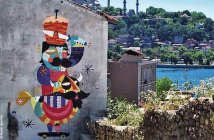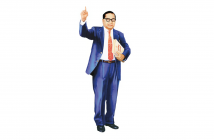As insightful as it is inventive, Civilized and Wild is an astounding selection of sculptural and photographic works by artists Sayaka Ganz and Young Sam Kim. Ganz, whose expressive medium of choice merges welding with sculpture, collects discarded plastic objects and welds them together to create flourescent colored animals in motion. Kim, a photographer and visual artist whose creative process has been heavily inspired by his hearing impairedness, harnesses the myriad color variations within a cityscape to illustrate the staccato notes of chaos that he cannot hear. The juxtaposition of the two repertoires within the Emmanuel Fremin Gallery space creates an unparalleled platform for introspection.
Inspired by animist philosophies within Japanese culture, Ganz resuscitates the life of plastic throw away objects to demonstrate the existence of energy within the most banal and inexpensive of scrap materials. Such a singular mission is accomplished with a rather illustrious execution; plastic cutlery, plastic hangers, and other throw away items that were previously abandoned have been masterfully manipulated to resemble floating amphibians and galloping stallions. Novel reinvention of this sort does not rest on aesthetic ambitions; Ganz uses the superficial materials to illuminate the otherwise unacknowledged depth within perceived or evidenced superficiality.
The artist’s preference for plastic has stimulated a great deal of psycho analytical pondering amidst the viewers: if there is in fact life energy or depth within superficial objects, could there exist a similarly complicated abyss within the plastic pretenses of human nature? According to Gantz, the answer is “Yes.” As the use of plastic in our daily lives corresponds with the human desire for a more convenient and easier way of life, so superficiality exists within humanity as a predictable platitude of perceived convenience. Such conveniences, however, conceal convoluted depths that lack the luster of Gantz’s armatures.
Kim, conversely, employs collaging within cityscape photography to convey evidenced superficiality within the city dweller’s misplaced ideals. These delusional dreams to which Kim alludes indubitably manifests as spiritual destitution. While he acknowledges the advantages of urbanization and city life on society, he readily recognizes their negative impacts on the evolution of societal consciousness and emotional well being. Ideals of success become a kind of plastic perfection that engulfs city dwellers into a venomous vortex of unfulfilled expectations and loss of humanity, despite material gain. While the vain cries of restlessness are inaudible to Kim, he harnesses his heightened visual sensitivity to depict the exhausting emotional noise that handicaps mankind’s spiritual health.
Perhaps the greatest strength of each artists is his/her own incomparable ability to project such allegorical assertions through manipulated materials. The cityscapes highlighted by Kim have been cleverly construed by the superficial values of the city inhabitants; such an artful construction supported by superficial fragments is a formidable parallel to Ganz’s ingenious armatures crafted of assembled wastes. While visually disparate, these distinct repertoires are fantastically threaded together through the psychic responses that they conjure within viewers.






